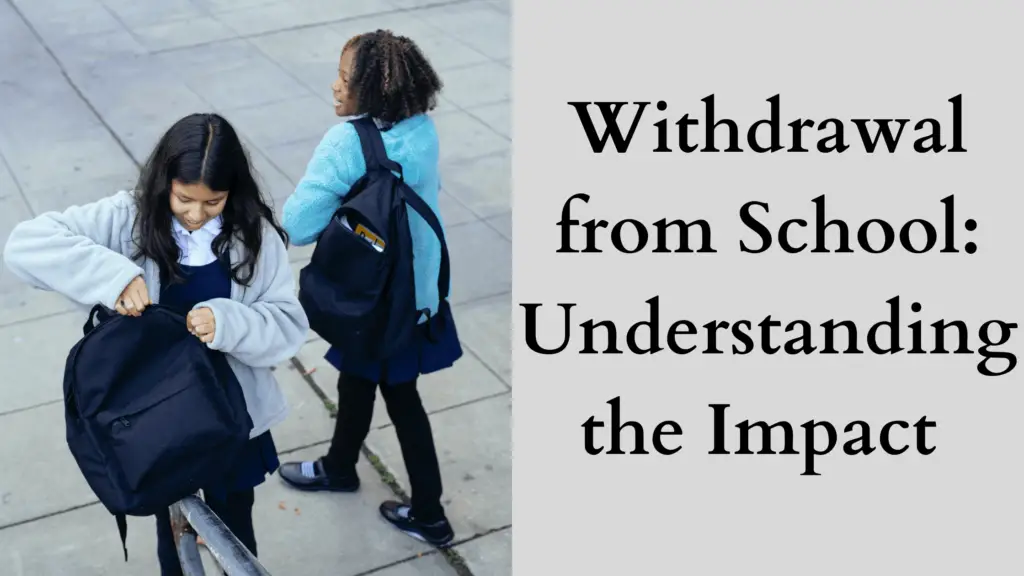Opting to withdraw your child from school is a multifaceted decision that holds the potential to profoundly shape their educational trajectory and holistic growth. This choice demands a deliberate approach, characterized by thoughtful contemplation and a thorough grasp of the potential outcomes. To circumvent unforeseen challenges, gaining a comprehensive grasp of the subject— what happens if I withdraw my child from school —is paramount. Such an understanding equips you with insights into the intricacies, ramifications, and opportunities associated with this decision.
Reasons for Withdrawing a Child from School
There are myriad reasons that might lead a parent to contemplate withdrawing their child from school. Some common triggers include dissatisfaction with the traditional education system, a desire for specialized education to meet unique learning needs, concerns about the child’s health and safety, instances of bullying or social discomfort, or even family travel that necessitates flexibility. Each family’s situation is unique, and it’s crucial to introspect and evaluate the motivations behind this decision. Consider discussing your reasons with educational experts or professionals who can provide insights into whether withdrawing your child from school is indeed the best course of action.
What Happens If I Withdraw My Child from School
So, what happens if I withdraw my child from school? The specific outcomes of this decision will be contingent upon your location and the underlying reason prompting the withdrawal. Nevertheless, as a general guide, anticipate the following developments:
- Your child’s enrollment status will be removed from the school’s records.
- A written notice of withdrawal will be necessary, including the withdrawal date, rationale, and your contact details.
- Submitting your child’s birth certificate or other identification proof might be required.
- A withdrawal fee might also be applicable.
Should your intention involve homeschooling, it’s essential to adhere to your state’s homeschooling regulations. These regulations can vary, but they usually mandate the provision of a specific level of education for your child, along with the maintenance of comprehensive progress records.
Read About: Can I Homeschool My Child Temporarily
Legal and Administrative Considerations
Before withdrawing your child from school, it’s imperative to be well-versed in the legal and administrative procedures involved. The regulations regarding homeschooling and alternative education options vary from one jurisdiction to another. Begin by researching the laws and requirements specific to your region. In most cases, you will need to formally notify the school of your intention to withdraw your child in writing. There may be specific forms to fill out, deadlines to meet, and documents to submit. Keeping meticulous records of all correspondence and adhering to legal protocols is not only crucial for maintaining a transparent relationship with the school but also for ensuring that your child’s educational journey remains lawful and well-documented.

Academic and Social Impact
As you think about what happens if I withdraw my child from school, the child’s academic progress should be present in the picture.
One of the primary concerns when withdrawing a child from school is the potential impact on their academic progress. Traditional schools offer structured curriculum, teacher-led instruction, and a defined educational trajectory. Transitioning to an alternative education option, such as homeschooling or online learning, can introduce a degree of uncertainty into your child’s learning journey. To mitigate this, consider crafting a personalized learning plan that aligns with your child’s learning style, strengths, weaknesses, and interests. This plan should incorporate diverse educational resources, online courses, and perhaps even local learning opportunities to ensure a well-rounded and enriching learning experience.
Also, as you think of what happens if I withdraw my child from school, do not forget the potential transition challenges.
Shifting from a traditional school environment to an alternative mode of education can be challenging for both you and your child. The absence of the traditional classroom structure and routine might necessitate a period of adjustment. Establishing a daily routine within the home, setting clear educational goals, and providing a variety of educational resources can help smoothen this transition. Creating a dedicated learning space and setting aside specific times for learning activities can also contribute to a more seamless shift from traditional schooling.
Emotional and Social Development
One of the notable advantages of traditional schools is the social interactions and friendships they facilitate. When considering withdrawing your child from school, it’s essential to consider how you will address this aspect. While alternative education options offer unique benefits, they might not provide the same level of daily peer interaction. To counteract this potential isolation, explore local clubs, sports teams, art classes, or community activities where your child can engage with peers and foster meaningful social connections outside of the traditional school setting.
The traditional school setting also offers a sense of structure and routine that can contribute to a child’s emotional well-being. The sudden shift from this structured environment to a more flexible learning setup can potentially disrupt your child’s emotional equilibrium. To address this, ensure that you maintain consistency in your child’s daily routine. Encourage open communication about their thoughts and feelings regarding the change. Additionally, create a support network involving family members, friends, mentors, and even online communities to provide emotional support and guidance.
Read About: Can I Homeschool Someone Else’s Child
Alternative Education Options
Homeschooling
Homeschooling presents a viable alternative to traditional schooling, allowing for a tailored educational experience. As the primary educator, you’ll have the opportunity to customize the curriculum to match your child’s learning pace, style, and interests. However, successful homeschooling requires careful planning and dedication. Research the homeschooling laws in your area, connect with local homeschooling communities, and curate educational resources that align with your child’s educational goals.
Online Schools
Online schools offer the advantage of a structured virtual learning environment. Your child can access accredited curriculum and interact with certified teachers while enjoying the flexibility of remote education. When exploring online schools, focus on finding reputable institutions that align with your child’s educational needs and preferences. Establish a daily routine that balances screen time with hands-on activities to maintain engagement and promote effective learning.
Unschooling
Unschooling takes a non-traditional approach to education by encouraging self-directed learning driven by a child’s natural curiosity. While unschooling offers creative freedom and flexibility, it requires substantial parental involvement. Creating an environment rich in learning opportunities, providing access to diverse resources, and facilitating your child’s interests are essential for the success of unschooling.
Hybrid Models
Hybrid education models offer a blend of traditional classroom instruction and alternative learning methods. Some schools provide the option for part-time attendance, combining in-person learning with home-based education. Research schools in your area that offer hybrid programs and assess how well the model aligns with your child’s needs and preferences.

Communication and Planning
When withdrawing your child from school, clear and respectful communication is vital. Notify the school administration, teachers, and classmates of your decision in a timely manner. This ensures that necessary paperwork is processed and that everyone involved is aware of the transition. Transparency and consideration in your communication can help maintain positive relationships and facilitate a smoother transition.
After withdrawal, focus on crafting a comprehensive learning plan tailored to your child’s needs and goals. Outline the subjects of focus, preferred learning resources, assessment methods, and any extracurricular activities you plan to include. A well-structured learning plan serves as a roadmap for your child’s educational journey and helps you track their progress over time.
Monitoring Progress and Reevaluation
As your child embarks on their alternative education journey, it’s essential to maintain a habit of regular check-ins. Review their work, discuss their experiences, and assess their understanding of various subjects. Regular assessments will help you identify areas of strength and areas that might require additional attention.
Periodically reassess the effectiveness of your chosen alternative education approach. As your child grows and their needs evolve, their educational requirements might change as well. Be open to reevaluating your methods and considering adjustments or even exploring new options if necessary. Flexibility and adaptability are key to ensuring your child’s continued growth and success.
Conclusion
Deciding to withdraw your child from school is a pivotal choice that demands thorough research, careful planning, and unwavering dedication. By understanding the legal and administrative aspects, assessing the academic and social impacts, and exploring various alternative education options, you can confidently provide your child with an enriching educational experience outside of the traditional classroom setting.







